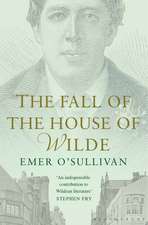Apologia Pro Vita Sua
Autor John Henry Newmanen Limba Engleză Paperback
| Toate formatele și edițiile | Preț | Express |
|---|---|---|
| Paperback (10) | 58.22 lei 3-5 săpt. | |
| CREATESPACE – | 58.22 lei 3-5 săpt. | |
| Bloomsbury Publishing – 22 oct 2014 | 107.27 lei 3-5 săpt. | +15.88 lei 4-10 zile |
| CREATESPACE – | 134.51 lei 3-5 săpt. | |
| – | 185.69 lei 3-5 săpt. | |
| Echo Library – 31 dec 2006 | 124.62 lei 38-44 zile | |
| Book Jungle – 3 iul 2008 | 158.39 lei 6-8 săpt. | |
| Bloomsbury Publishing – 31 dec 1945 | 165.10 lei 6-8 săpt. | |
| TREDITION CLASSICS – 31 ian 2012 | 226.40 lei 6-8 săpt. | |
| TREDITION CLASSICS – 31 ian 2012 | 228.69 lei 6-8 săpt. | |
| Cambridge University Press – 27 oct 2010 | 469.83 lei 6-8 săpt. | |
| Hardback (2) | 324.04 lei 3-5 săpt. | |
| – | 324.04 lei 3-5 săpt. | |
| OUP OXFORD – 7 sep 1967 | 361.17 lei 31-37 zile |
Preț: 58.22 lei
Nou
Puncte Express: 87
Preț estimativ în valută:
11.14€ • 12.11$ • 9.37£
11.14€ • 12.11$ • 9.37£
Carte disponibilă
Livrare economică 31 martie-14 aprilie
Preluare comenzi: 021 569.72.76
Specificații
ISBN-13: 9781517087258
ISBN-10: 1517087252
Pagini: 124
Dimensiuni: 216 x 279 x 7 mm
Greutate: 0.3 kg
Editura: CREATESPACE
ISBN-10: 1517087252
Pagini: 124
Dimensiuni: 216 x 279 x 7 mm
Greutate: 0.3 kg
Editura: CREATESPACE
Caracteristici
Newman's vivid account of his intellectual conversion to the Catholic Church, a landmark work of literature now published in the Bloomsbury Revelations series.
Notă biografică
John Henry Newman (21 February 1801 - 11 August 1890) was an English theologian and poet. His major writings include the Tracts for the Times, his autobiography Apologia Pro Vita Sua, the Grammar of Assent, and the poem "The Dream of Gerontius." He also wrote the popular hymns "Lead, Kindly Light," "Firmly I believe, and truly," and "Praise to the Holiest in the Height."Newman was a controversial figure in the religious history of England, being one of the leaders of the Oxford Movement, an influential and controversial group of Anglicans who wanted the Church of England to bring back many beliefs and rituals from before the English Reformation. The movement was somewhat successful and in 1845 Newman, joined by some of his followers, left his position as the vicar at St. Mary's, Oxford, and was received by the Catholic Church. In 1879, he was created a cardinal by Pope Leo XIII in recognition of his services to the cause of the Catholic Church in England and was canonised as a saint in 2019.
Cuprins
Editor's introduction; Author's preface; History of my religious opinions up to 1833; History of my religious opinions from 1833 to 1939; History of my religious opinions from 1839 to 1841; History of my religious opinions from 1841 to 1845; Position of my mind since 1845; Notes; Supplemental matter: Chronological list of letters and papers quoted in this narrative; List of the author's works; Letter to him from his Diocesan; Addresses from bodies of Clergy and Laity; Additional notes; Appendices: Mr Kingsley and Dr Newman: A correspondence on the question whether Dr Newman teaches that truth is no virtue?; 'What, then, does Dr Newman mean?' A reply to a pamphlet lately published by Dr Newman, by Charles Kingsley; The 1864 text of the Apologia'; Editor's notes; Index
Descriere
Descriere de la o altă ediție sau format:
Of the spiritual odysseys which dominate the literature of nineteenth-century England, Newman's Apologia Pro Vita Sua is universally acknowledged as one of the greatest and yet one of the most difficult. Newman wrote the Apologia in 1864, as a reply to Charles Kingsley's attack on his veracity and that of his fellow Roman Catholic clergy; the following year he revised it extensively and thereafter amended new impressions almost until his death in 1890. This fine edition, long unavailable, has been reissued for the centenary; it includes all the variants resulting from Newman's revisions, in both the printed texts and the surviving manuscripts.
Of the spiritual odysseys which dominate the literature of nineteenth-century England, Newman's Apologia Pro Vita Sua is universally acknowledged as one of the greatest and yet one of the most difficult. Newman wrote the Apologia in 1864, as a reply to Charles Kingsley's attack on his veracity and that of his fellow Roman Catholic clergy; the following year he revised it extensively and thereafter amended new impressions almost until his death in 1890. This fine edition, long unavailable, has been reissued for the centenary; it includes all the variants resulting from Newman's revisions, in both the printed texts and the surviving manuscripts.
Recenzii
`Every library should have this edition'Choice
`Provides almost everything needed by anyone wishing to grapple with the "facts and problems" which bear on the genesis of the Apologia ... Svaglic's introduction gives evidence of a sensitive understanding of Newman's spiritual difficulties ... has rendered an enormous service to all students of nineteenth-century literature ... There must be few works of comparable size which can be so rarely faulted as this superb edition.' Modern Language Review
`Dr Svaglic and the Clarendon Press have put all students of Newman in their debt.' Religious Studies
`Provides almost everything needed by anyone wishing to grapple with the "facts and problems" which bear on the genesis of the Apologia ... Svaglic's introduction gives evidence of a sensitive understanding of Newman's spiritual difficulties ... has rendered an enormous service to all students of nineteenth-century literature ... There must be few works of comparable size which can be so rarely faulted as this superb edition.' Modern Language Review
`Dr Svaglic and the Clarendon Press have put all students of Newman in their debt.' Religious Studies













